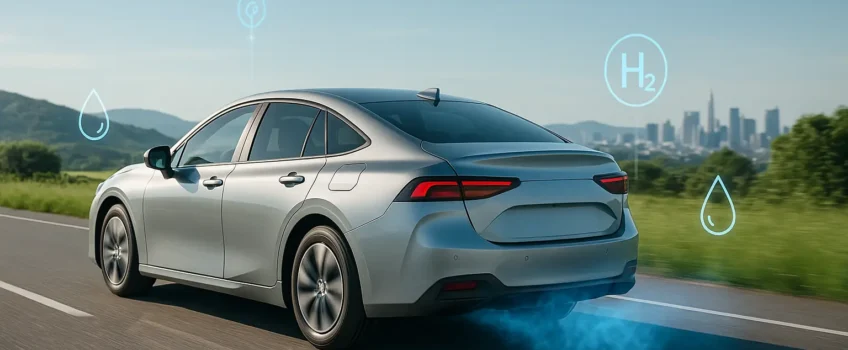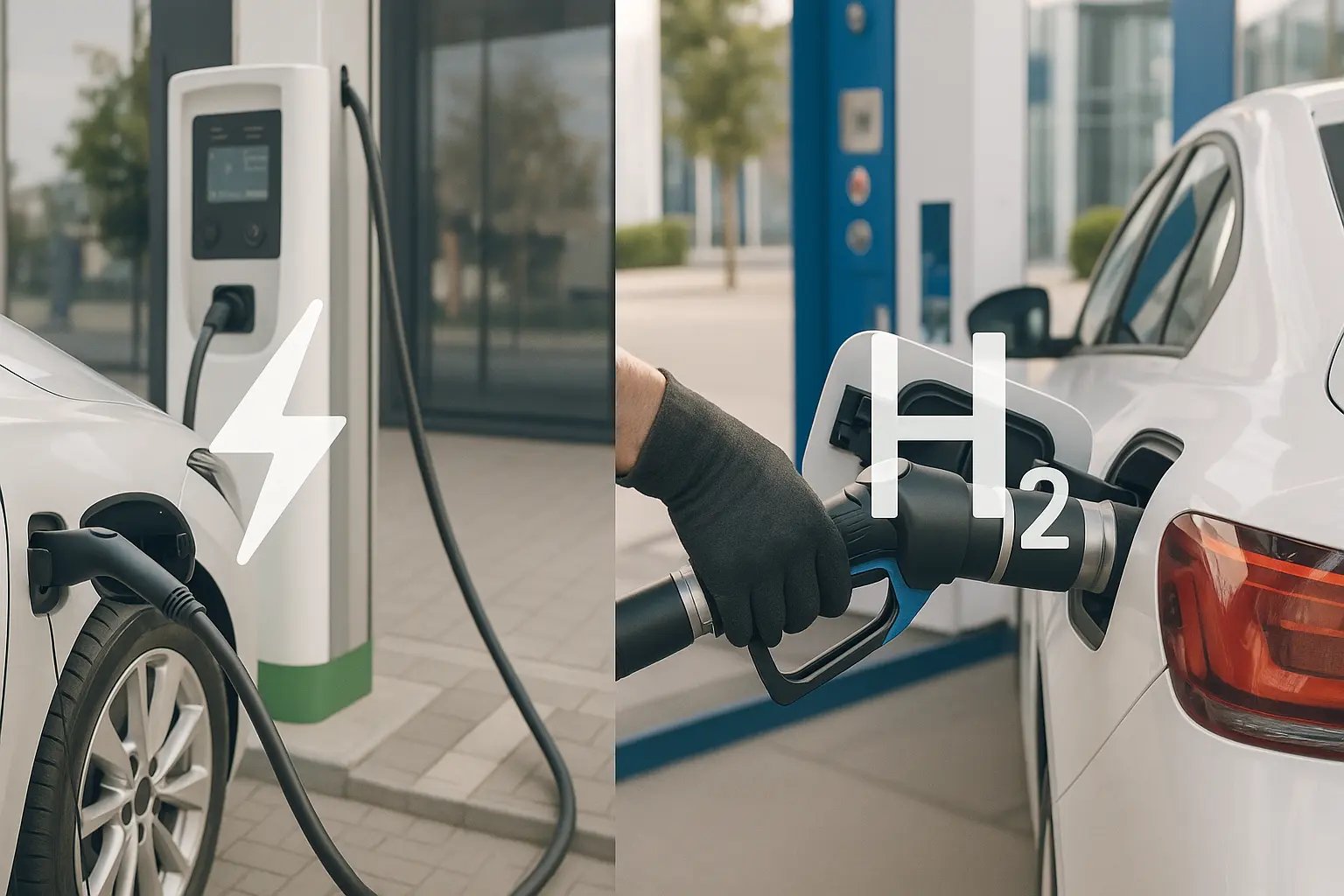
Are Hydrogen Cars the Answer to Cleaner, Longer-Lasting Motoring?
Have you ever wondered what comes after electric vehicles? Could hydrogen cars be the next step in cleaner, more efficient driving? And what does it all mean for everyday motorists like you?
While many drivers don’t give hydrogen cars a second thought, they are quickly getting more attention, especially with major car manufacturers like Toyota developing new hydrogen combustion engines that promise lower emissions without ditching traditional mechanics.
In this article, we’ll explore the differences between these two types of zero-emission vehicles and take a closer look at how they compare in terms of sustainability, performance, and practicality. Even though hydrogen may still be a few years from mainstream, we’ll show you how smart vehicle maintenance, car MOTs, and driving habits today can help you reduce emissions and extend your car’s lifespan right now.
Introduction to Hydrogen Cars vs Electric Vehicles
We’re entering an exciting era of innovation in the automotive world. While fully electric vehicles (EVs) are dominating headlines, a different solution may soon be pulling up to the curb: hydrogen-powered cars that drive like the petrol and diesel vehicles you’re already used to—but without the carbon guilt.
Whether you’re considering making your next vehicle purchase an eco-friendly one or simply curious about the future of transportation, read on to find out more about hydrogen cars and electric vehicles.
What Are Hydrogen Cars, and How Do They Work?
When we hear “hydrogen cars,” most people think of hydrogen fuel cell vehicles (HFCVs)—where hydrogen is converted into electricity to power a motor. But Toyota’s approach is different. Their engineers are developing a hydrogen combustion engine—which burns hydrogen as fuel, similarly to a petrol engine, but emits only water vapour instead of CO₂.
This means:
- Cleaner emissions
- Familiar driving experience
- No lithium-ion batteries required
According to Toyota, the experimental GR Corolla H2 is already being tested on track, proving that hydrogen combustion has real-world potential. And here is all you need to know about Toyota’s new breakthrough in hydrogen combustion engine technology.
Hydrogen Cars vs Electric Cars: What’s the Difference?
Both aim to reduce emissions, but they take different roads to get there.
| Feature | Electric Cars | Hydrogen Combustion Cars |
|---|---|---|
| Power source | Battery (charged from grid) | Hydrogen gas (burned in engine) |
| Emissions | None (at point of use) | Mostly water vapour |
| Refuelling/recharging | 30–60 minutes or more | 5–10 minutes |
| Driving experience | Silent, smooth | Similar to petrol driving feel |
| Infrastructure (UK) | Growing | Limited but expanding |

So, will you be switching to hydrogen any time soon? Not just yet. Hydrogen cars still face infrastructure challenges—there are only around a dozen public hydrogen refuelling stations in the UK, mostly around London. But the progress is undeniable, and Toyota believes this tech could complement electric vehicles rather than compete with them directly.
Could Hydrogen Help Fill the Gaps?
This is where hydrogen combustion cars might offer an alternative. They could potentially deliver:
- Fast refuelling (like petrol)
- Familiar driving feel
- Lower reliance on battery-heavy supply chains
But with limited infrastructure and high production costs, hydrogen is still in its early stages—which is why good car maintenance remains key for today’s drivers.
What Does This Mean for UK Drivers?
Even though hydrogen cars aren’t yet mainstream, the fact that major manufacturers like Toyota are investing in alternatives shows us one thing: the future of driving is changing.
But here’s the good news: you don’t have to wait for a hydrogen vehicle to start driving smarter today.
The choices you make now—about how you service your vehicle, how well your tyres are maintained, and how efficiently your car runs—all play a role in reducing emissions and extending your car’s lifespan. Whether you drive a petrol, diesel, hybrid or EV, it still needs regular care to stay roadworthy and efficient.
Why Global EV Adoption Is Still Facing Challenges
Electric vehicles (EVs) are widely seen as the future of driving—but that doesn’t mean the road to full adoption is smooth.
1. Infrastructure Gaps
While the UK is making good progress, charging infrastructure is still uneven. Cities tend to have better coverage, while rural areas lag behind. As of April 2024, there are around 53,000 public charge points in the UK—up from 37,000 in 2023—but fast chargers make up a much smaller share. Here’s a closer look at the charging stations in the UK.
2. Upfront Costs
Although running costs are low, the initial purchase price of EVs remains a barrier for many drivers. Incentives like the plug-in grant have ended, and some motorists are holding out for more affordable models or a wider second-hand market.
3. Battery Limitations and Lifespan Anxiety
Concerns about battery degradation, replacement costs, and winter performance still worry some drivers—especially those without off-street parking or a home charger.
4. Range Anxiety
Despite improvements in EV range, some drivers still hesitate to switch from petrol or diesel for longer journeys—particularly in colder climates or rural regions.
5. Supply Chain Issues
From lithium and rare earth metals to global chip shortages, EV production has been hit by delays and limited availability. Some new buyers are facing wait times of six months or more for certain models.
Keeping Today’s Cars Clean and Roadworthy
At Elite Garages, we may not be servicing hydrogen vehicles yet—but we support every other kind of car on UK roads:
- Petrol and diesel vehicles
- Hybrid cars
- Fully electric vehicles (EVs)
Vehicle Maintenance That Supports Efficiency
When your car is properly maintained, it runs cleaner, safer, and longer. That includes:
- Regular car servicing for engine health and emissions
- Brake and exhaust checks to limit pollutants
- Battery checks—especially important for EVs and hybrids
View our servicing options here.
Car Tyres and Wheel Alignment: More Important Than You Think
Worn tyres and poor alignment don’t just affect handling—they waste fuel and increase emissions. A tyre that’s under-inflated or misaligned adds drag, making your engine work harder.
We offer:
- Free tyre safety checks
- Affordable wheel alignment and tracking services
- Top-quality car tyres for all vehicle types
Elite Garages is here to help whether you are looking for tyres in Portsmouth, clutch replacement in Horsham, brake replacement in Caterham or cambelt service in Fareham.
MOT Testing to Keep You Safe and Compliant
With several branches across the south and south-east of England; from Maidstone, Pulborough and Haywards Heath to Portsmouth, Newport and Southampton, your annual MOT helps ensure your vehicle meets safety and emissions standards. While tyres, emissions, brakes, and lights are all checked during the inspection, there are a few pre-MOT checks you can do to maximise the chance of passing your MOT the first time.
Recommended: Where Do I Find Class 4 MOT Near Me?
Hydrogen Technology and the Circular Economy
Toyota’s innovations in hydrogen cars don’t just represent progress—they reflect a larger trend toward reusable energy, sustainable fuels, and a circular economy. In engineering and manufacturing, these ideas are reshaping how we think about waste, emissions, and longevity. Learn more about supply chain decarbonisation in this fascinating article.
How Might MOTs and Maintenance Change with Hydrogen Cars?
While hydrogen cars—especially combustion-style ones like Toyota’s prototype—aren’t mainstream yet, they could bring new requirements for MOT testing and servicing down the line.
MOT and Emissions Considerations
Hydrogen combustion engines produce minimal CO₂ but can emit small amounts of NOx (nitrogen oxides), similar to efficient petrol engines. That means:
- Emissions tests may evolve, focusing more on NOx than CO₂
- Hybrid MOT frameworks may be adapted to accommodate both fuel-based and clean-energy tech
- UK regulations will likely need to expand once hydrogen vehicles are commercially available
Maintenance Differences
Hydrogen combustion engines still use many moving parts, like pistons and gearboxes—unlike battery-electric vehicles (EVs), which have fewer wear components. So while EVs typically require less mechanical upkeep:
- Hydrogen cars would still need servicing for clutches, exhausts, brakes, and air filters
- Maintenance would likely resemble petrol/diesel vehicles, but with hydrogen-specific checks (e.g. fuel system seals, tank safety)
Why it matters for Elite Garages
Even before hydrogen becomes mainstream, Elite is already well-versed in maintaining a mix of petrol, diesel, hybrid, and electric vehicles. Our experience with newer tech and evolving MOT standards means we’ll be ready to service what’s next—whether it runs on fuel, electric charge, or hydrogen.
Final Thoughts: Will Hydrogen Cars Be the Future?
It’s too soon to say whether hydrogen will overtake electric—but there’s no denying that hydrogen-powered cars like Toyota’s GR Corolla H2 are challenging assumptions. What we do know is this: motoring is evolving, and keeping your current vehicle in great shape is the best way to stay ahead.
So whether you’re driving to work, heading to the shops, or planning a road trip, Elite Garages is here to help you drive smarter, safer, and more sustainably—no matter what fuel is in your tank.
Ready to look after your car while keeping an eye on the future? We’ll help you stay road-ready—now and in the future where hydrogen cars could be a common sight on UK roads.
FAQS ON HYDROGEN CARS
Click the + to read any answer or visit our most FAQ page to review the most frequently asked questions across all our Elite Locations.
If you click on a ‘Category’ or ‘Tag’ link, the page will ‘refresh’ and reload the page showing the top of the page first, you’ll then just need to scroll down to the FAQ section to see the results for the Category or Tag you selected.
Hydrogen cars are already available in limited numbers in the UK, with models like the Toyota Mirai and Hyundai Nexo on the market. However, widespread adoption is still a few years away due to limited hydrogen refuelling stations. Toyota’s latest hydrogen combustion engine is still in development, but signals that mainstream availability may not be far off.
Hydrogen cars and electric vehicles (EVs) both reduce emissions, but they serve different needs. EVs are more widely available and have a growing charging network, while hydrogen cars offer faster refuelling and may appeal to drivers who prefer traditional engine performance. For most UK drivers in 2025, EVs are more accessible—but hydrogen cars are emerging as a serious alternative for the future.
Hydrogen cars are vehicles that run on hydrogen fuel instead of petrol or diesel. Most hydrogen cars either use a fuel cell to convert hydrogen into electricity or, like Toyota’s new model, use a hydrogen combustion engine that burns hydrogen in a similar way to traditional engines. The result? Clean energy, minimal emissions, and a familiar driving experience—without relying on batteries.
About Us
Opening Times
Saturday : 8:30–4:00
Sunday : closed
More Information
Contact UsCustomer Information Pack
Check MOT Due Date
Free MOT reminder
Careers



